The Stable Boy
Kingdom of the Franks
Île-de-France, Melun.
September, in the year of our Lord 1066
Kingdom of the Franks
Île-de-France, Melun.
September, in the year of our Lord 1066
On the banks of the Seine, the fortress of Melun was restless. The servants had spent the last two days loading carts with supplies; in the stables, horses were being selected for the journey, and the blacksmiths were inspecting the guards’ weapons and chainmail. This activity helped ease the growing anxiety taking hold of the castle. A few mercenaries traveling to Normandy to join William’s army had even stayed behind, hoping to find less risky employment in the escort of the King of the Franks. "Anyway," they thought, "the wind hasn’t come. How long can a trip to Reims take?"
Philippe was in the stables; an additional penance had been imposed on him. He closely followed the preparations for the journey, spending hours asking how many horseshoes were needed and how much oats for the horses. Also, whether there was enough money to pay the mercenaries and how many there were. The servants were somewhat exhausted by his intensity but proud to say they had spoken with the king.
“Philippe! Philippe!”
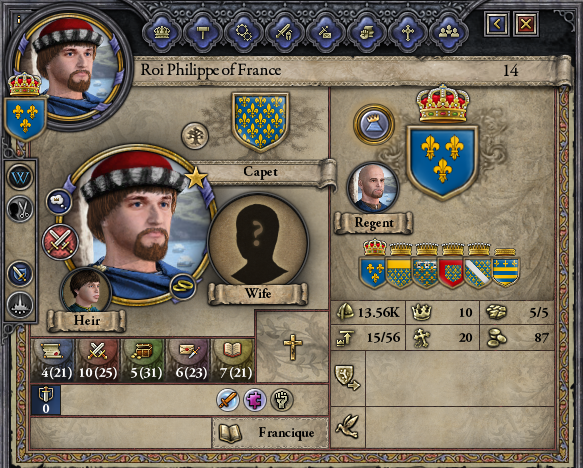
Philippe turned, not because of the loud shout, but because of the strong tug on his cloak. He had to leave the stable boy halfway through explaining the difference between a warhorse and a draft horse. Emma was standing there, holding her skirt to avoid the stable dirt.
“Philippe, did you speak with our mother to let me go to Reims?” Emma said, looking at him intensely.
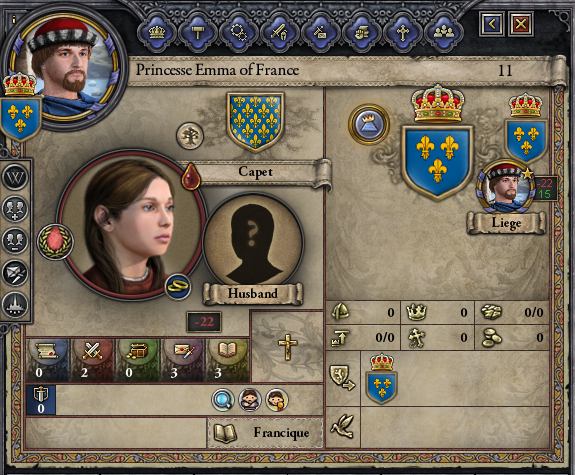
“Emma... the stables are no place for a princess of France.”
“Alright, Philippe. Did you ask our mother if I can go to Reims?”
“Melun is full of strangers...”
“And any one of them could be happy to kidnap a princess of France. That’s why I let Raoul follow me,” Emma replied, pointing to the bald man running toward them.
“Raoul,” said Philippe, looking at the regent of France.
“Sorry, my lord,” said Raoul, slightly sweaty.
“I told him if he wanted to stop me, he could dare to lay a hand on the princess of the Franks. He’d fall as fast as he got up.” Emma spoke as if Raoul wasn’t there, and the man acted as if he didn’t hear anything.
“Enough, Emma...” Philippe blushed, glancing at Raoul out of the corner of his eye. “That’s enough.”
“Alright, Philippe...”
“I’m your brother, Emma, but also your king.”
Emma fell silent, staring at him intensely. She made a small bow:
“Did you consider my request?”
“I gave you my word it would be done. It saddens me that you think of me as a king without honor.”
“I’m sorry... Philippe... Your Majesty.”
“It will be done, trust me. Now go back inside.”
Emma made a second bow and walked toward the fortress. She paused for a moment:
“If Your Highness weren’t my brother, I might have mistaken him for the stable boy.” Emma looked disapprovingly at Philippe’s dirty clothes and mud-covered boots; after a second bow, she continued on her way.
“Raoul... sorry about that... Could you make sure he returns with the children?”
“Sorry to interrupt, Your Highness. But don’t worry, I always have trusted men watching,” he said, pointing to two men dressed as servants but with war scars. “They alerted me as soon as he escaped his tutors.”
“A strong character...”
“His royal blood can’t be denied. May I have a moment of your time, Your Highness?”
“Of course, Raoul.” Philippe walked inside the fortress with Raoul.
The stable boy could barely contain his joy. Not only could he boast that the king had spoken to him, but he could also say he had talked to the regent and Princess Emma. He saw the envious and expectant looks from the other stable boys. That night, he would pay for the story with plenty of beer at the tavern and first make them listen to the difference between a warhorse and a draft horse, even though they all knew it.
They walked to the regent’s chambers, talking about the weather and how long the journey might take. Raoul opened the door with a bow. To Philippe’s surprise, inside were his mother, Princess Anna, and Prince Bishop Guido. Philippe bowed first to the bishop, kissing his hand, then to his mother.
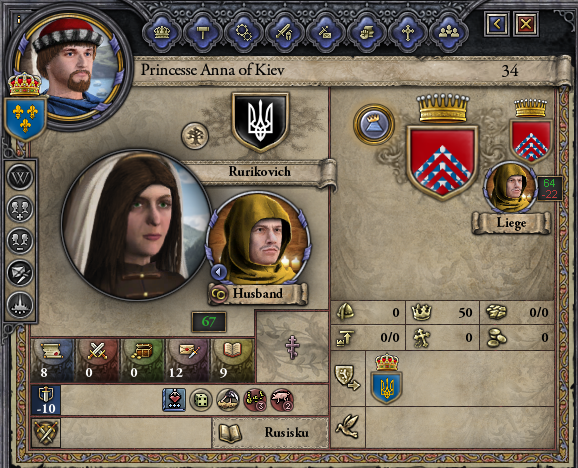
“Raoul told me you gave your word to your sister,” said Anna, holding a glass of wine. Her eyes were deep, her expression somewhat tense. She wasn’t a beautiful woman, but she was exotic. She had come from the East decades ago to marry King Henry, from the lands of the Rus. She barely had an accent, but something in the tone of her voice still gave her away.
Philippe looked at Raoul with some reproach and then at Bishop Guido. Guido, while looking at Princess Anna, seemed anxious:
“It is important,” said Anna, “that a king can keep his word. I’m listening.”
“If it is good for the people of France to see their king, it would also be good for them to see their sister,” said Philippe without hesitation; he had been preparing his speech since his sister had forced him into this. “It’s not only a penitential journey; otherwise, we wouldn’t be bringing carts, horses, and guards. It is also to show that the King of the Franks does not hide from a bastard...”
“From the Duke of Normandy,” interrupted Anna. “It is not right to refer to a vassal that way.”
“That’s true,” Philippe was somewhat confused. His mother had cut his inspiration, and he didn’t know how to continue. He got distracted looking at the tapestries hanging on the walls. He looked at the wooden table and chairs around it; only his mother remained seated. Guido looked at him urgently. “I ask you to allow me to take my siblings with me.”
Anna looked doubtful, took a sip of wine:
“You will have guards.”
“That will be done; some mercenaries are already being hired, as I understand.”
“Not only mercenaries... The Baron of Chevreuse will accompany you.”
“Even him?! That’s too much!”
“Then it will not be done!” Anna stood up; in other times she would have towered over Philippe, but now the boy had grown.
“You will honor your mother and father, Philippe,” Guido hurried to say. “Since your father is now in the presence of the Lord, I’m sure he is displeased to hear you speak to your mother that way.”
Philippe blushed with shame. He longed to escape the control of his elders. This trip to Reims was his chance; if only servants and mercenaries accompanied him, he could manage, but with the presence of a noble, even a minor one, it would complicate things. Once again, under others’ care, only this time outside Melun. He only hoped that the marshal, Count Ertienne, who was also in Melun, would not join. He wished he had also left, like the rest of the council, to spend the winter on their own lands.
“I’m sorry, mother...”
“The Count of Sens will also go,” said Bishop Guido without letting Anna answer. “You are not trained in medicine, and your sister is young. A cold is dangerous for a child. Yes, you don’t have to tell me you will sleep in castles along the way, and when there is no castle nearby, the king will only stay in the best inns. But that is out of the question.”
Philippe could see that the bishop was speaking to him, though he was really addressing his mother. He had no options. Guido was his ally in this matter. If Anna said no, he would break his word to his sister.
“I dislike it, but I understand. I regret yelling at you, mother.”
Anna looked at Guido, but when she spoke, she addressed Philippe:
“If the good of the kingdom of the Franks requires it, so be it, but I still dislike it.”
Philippe felt she was addressing Guido, even though she looked at him. Anna offered her hand, and he hurried to kiss it:
“Come with me, you need to clean up; you look like a beggar.”
Guido sighed with relief as he poured himself a glass of wine.
"I thought we wouldn’t make it."-said Guido.
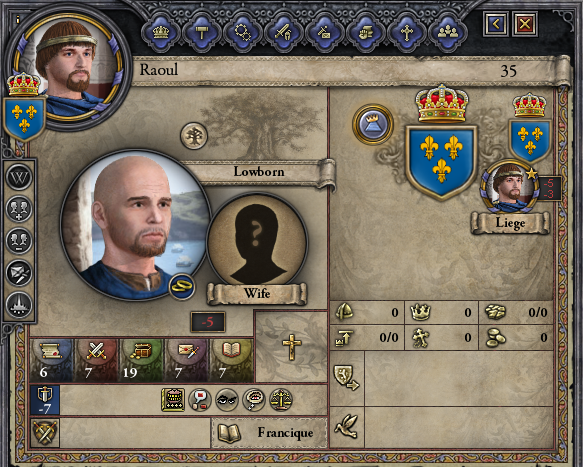
"Like any mother, she worries about her children," said Raoul, peeking through the door to make sure Phillipe and Anna were far enough away. He slammed the door shut. He poured himself some wine before continuing. "They don’t realize they’ve already grown up, especially Emma. I pity the poor man who marries her."
"In the end, she’ll submit; it’s a woman’s nature," Guido unconsciously pressed his stomach; lately, he’d been feeling a constant discomfort.
"Maybe... Have you thought about my proposal, my lord?"
"It seems risky... and I don’t think the Duke of Aquitaine will agree. It would be madness; the southern lords would rebel against him."
"It would also be madness not to try. We have few options, my lord," Raul closed the windows after first glancing outside. Then he sat down opposite the bishop. "I know you could convince Duke Guilhem. If you can’t, no one can."
"You’re overestimating my abilities."
Raoul had served the bishop for years. At first, he had been in charge of buying ink and parchment, then the tithes, and when Guido was appointed chancellor by King Henry, the latter entrusted him with organizing royal banquets—a seemingly discreet position, but one that had brought him close to power. Close enough to present himself as a compromise between the great nobles after Henry’s death. They were too jealous of one another to leave the regency in the hands of a commoner. That way, they ensured no one would gain an advantage over the king. Raúl felt comfortable, staying silent when he had to and enduring the slights he had to endure. He always looked over his shoulder. No one knew when one of the great nobles might decide they didn’t want the son of a wealthy cloth merchant, after all still a merchant, to be in charge of the regency. Outside a few guards or servants, he had no knights at his service to prevent someone from cutting his throat—at least not yet.
"It’s a journey too long to Bordeaux..." Guido felt the stomach pain ease and discreetly scratched above his navel.
"Duke Guilhem’s court is now in Poitiers, not Bordeaux; it’s closer... because of William."
"You know we tried once already; the Duke of Aquitaine’s answer was blunt. He won’t marry his daughter to the king just to erase his house’s name."
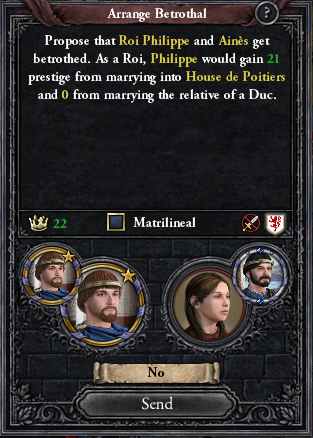
"The brother... we haven’t tried with Prince Hugues."
"If he already rejected the king, do you think he’d accept the brother? It would be the same result."
"He rejected the king because that would mean Aquitaine would fall under the crown’s control. It’s not the same with Prince Hugues."
"It’s almost the same... Hugues is the heir."
"I don’t think so. We have to try. The crown is alone... we need a strong ally. If we marry him to one of William’s daughters, the bastard will rule France, win or lose in England... you said so yourself..."
"That’s true..."
"If we look towards Hispania, considering the king’s holy piety, we’ll end up exhausted fighting the infidels..."
"Enough... you don’t need to go on... I’m already ashamed that such an unchristian thought came from me."
"You are a loyal man to the kingdom... let’s give this idea a chance..."
Raoul saw Guido still hesitating. He just had to push him a little more; if anyone could convince Guilhem, it was Guido. He had known it the day Guido convinced his stingy father to let his only son abandon the family business to serve the Church; he was a man capable of convincing anyone. Later he discovered he was also a man who could be pushed to convince anyone. He asked God’s forgiveness for using him.
"Are you still working on your poems?"
"You know I am; the ink is almost finished."
"I’ll order more; you don’t need to worry about that," Raúl poured some more wine for the bishop. "There are no poets like the Occitans... I’m sure you could find great inspiration at the duke’s court..."
"You’re shameless." Guido had been thinking about the idea. Something could be done, it would hardly work, but he trusted Raúl. There was nothing to lose by trying. "When could we leave?"
"I serve the kingdom as you do," Raúl sighed relieved inwardly. "As soon as the king and Princess Emma leave. Leave the queen mother to me; I will convince her to allow Prince Hugues’s journey south."
They kept talking most of the day, while servants brought them wine, cheese, grapes, and some meat. Guido spoke at length about the depths and subtleties of the Occitan language, much closer to Latin than the language of the Franks. He was surprised to learn that Raúl had been studying the language in his little free time and congratulated him on his diligence. From the start, he had noticed that the weaver’s son had a good mind for numbers, but not that he was also interested in the noble arts. He sent one of the servants to bring the parchments he had been working on for his Vox Francorum, an elegy to the Capetian kings. Raoul could only think that soon he would have knights at his service. Late at night, he sent for one of the stable boys and gave precise orders to reserve some horses and also a donkey.
Out of pure envy, they had made him work late into the night. Payen lingered reluctantly in the tavern, which was packed with mercenaries, rough and heavily armed men. The stable boys had been forced to corner themselves in one side of the room. But for now, he felt like a king.
At first, they treated him with indifference, trying to see if they could get something out of him without paying. But they hadn’t counted on his patience. Finally, they asked him, and he simply said he was thirsty. They cursed him while buying him a full pint; he savored the taste of the free beer.
—The king was asking me about the difference between a travel horse and a cart horse —he began to speak.
—One is strong and muscular, and the other is agile with slender legs.
Simon was four years older and not well liked; he had little patience and usually whipped the animals as soon as they showed reluctance. But everyone sided with him, elaborating on the differences between the two types of horses to annoy Payen. He simply kept drinking his beer until the conversation died down, and they bought him a second pint.
The fire crackled, and the tavern keeper defended the pork on the spit from a particularly voracious group of mercenaries.
—Well, the king, blessed be his name, didn’t know, because that’s the stable boys’ job, not the kings’. Then came Princess Emma and the regent... The king had promised to take her with him to Reims, so I already have one of the white mares ready, which is quite docile... the new one... for Princess Emma.
—What would you know if she’s going or not? —Simon was choking on bread dipped in oil and garlic.
—Well, it turns out the king gave his word, and what the king says is law.
—What the nobles say is law, Payen. If the Duke of Flanders doesn’t give permission to pay the forage at once... I don’t think that mare will leave Île-de-France.
That made most of the group turn against Simon, because the Duke of Flanders controlled the kingdom’s finances and, although he was with his son-in-law Duke William of Normandy in Rouen, he refused to loosen the purse strings.
—You’re a pig and you eat like a pig, Simon.
—And you think you’re better than you are, Payen. You didn’t speak with any princess or any regent; you just stood there while none of them noticed you. Even a mule could do that...
Payen stood up, grabbed his pint of beer, and threw it at Simon’s head. Simon was faster and the pint smashed against the wall.
The stable boys split into two groups quickly and began hitting each other with chairs and fists, amid the innkeeper’s hysteria as he called for the guards. Taking advantage of the situation, the mercenaries pounced on the pork, cutting it into pieces and laughing.
—Look what you did, you damned pigs! —the innkeeper shouted, grabbing a club to charge at the mercenaries.
The man didn’t stand a chance; the mercenaries wore chainmail and were trained for war. They disarmed him without trouble and began beating him with the club.
The stable boys felt guilty, since the innkeeper often gave them beer on credit, so they grabbed chairs and charged at the mercenaries. They managed to break the heads of a couple who were caught off guard, but soon they had to run out of the tavern. The mercenaries had drawn their swords and were drunk enough to spill blood.
—Melun, stand up! Stand up, Melun, they’re killing your sons! —Simon shouted and ran like the devil, for his life depended on it.
Some of the villagers came out carrying clubs or farming tools. Many others preferred to barricade the doors, and only the village fool ran off toward the castle.
The mercenaries were few, but they knew what they were doing. They gave the villagers a monumental beating. Payen and another boy tried to climb onto a roof when a mercenary appeared. The boy ran off, but Payen was frozen with fear.
The mercenary had his sword drawn, took a couple of steps toward him, and Payen noticed he was quite drunk. He prayed to the Virgin Mary and took off running. The Virgin must have heard his prayers because the man stumbled halfway through the chase.
It was his moment to escape the village, but he could still hear the screams. He looked around desperately and found a rock big enough. The mercenary was just getting up when Payen smashed the rock into his head, sending him back to the ground. The man began to vomit, and Payen thought he had killed him, but the man was only howling in pain and vomiting as well.
He still had to struggle and punch him a couple of times to take the sword away. Then he went back to the middle of the fray. The women peeked through the shutters, shouting curses at the mercenaries. A couple of mercenaries had come out of the tavern with torches ready to set fire.
Two men lay dead on the ground; Payen recognized them by sight... servants, just like him.
The mercenaries began to loot and crush the resistance; they knew how to do it. Courage abandoned Payen, who hid as best he could in a corner. First, they went after the men still standing, ignoring the women. Then, they started grabbing whatever they could from the houses: salt, metal pots, and supplies. Only then did they begin to divide up the women, but they were poorly coordinated. A hunchback who seemed to be in charge kept falling down drunk. It was a rather improvised raid.
—The king! The king! —shouted one of the women.
The sound of horses was deafening; about fifty riders in chainmail, helmets, shields, and lances appeared. They wore the colors of the royal house and the Count of Bourges. The kingdom’s marshal rode at the head of the group, sword in hand:
—Drop your weapons! Drop your weapons in the name of the king!
Payen hurried to throw his sword as far as possible, but the mercenaries seemed to be weighing their options; he regretted having done it.
—Drop your weapons now! —the Count of Bourges looked furious.
Philippe was terrified but tried not to show it. His mother had locked herself in with his siblings, and for the first time, he had dared to disobey her. Guido and Raoul had also tried to stop him. When the boy came running, shouting in the Melun courtyard, alarm spread. At first, it was thought that some noble might have dared to loot the village and try his luck. But no noble would dare so much, except his uncle, the Duke of Burgundy, who had already spilled family blood. Philippe feared his uncle; that man did not respect the laws of men or God. But he couldn’t just lock himself in Melun when only a few kilometers away the crown’s subjects were being dispossessed.
—If he catches you, who knows what he’ll do! —Anna of Kiev begged him, grabbing his hand and pulling him. Hugues barely spoke and looked nervous. Emma, who was trying to appear brave, said nothing either—. I forbid you! I am your mother!
—And I am the king of the Franks —Philippe kissed her on the forehead.
He felt mean for having so strongly wished the Duke of Bourges wasn’t in Melun. Philippe had never been to war, and although he knew how to hold a sword, he didn’t overestimate his skill. Besides, he counted on the knights of Bourges if it really was a raiding party from Burgundy.
—I will give my life for the king if necessary, Your Highness —Etienne of Bourges was already on his horse, giving orders to his men to form up.
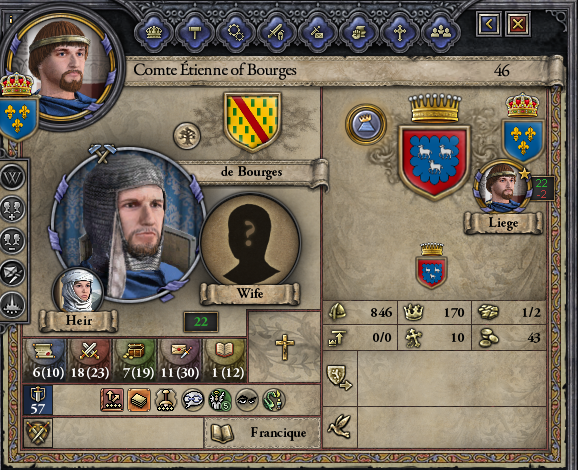
They rode as if the devil were chasing them. Philippe saw some houses burning and heard the screams. The banner of Bourgogne was nowhere to be seen. The smoke made his eyes water and dried out his throat. He was stunned by the sight of the dead; he had never seen one before. He fought back the urge to vomit; he couldn’t afford to.
Count Ertienne shouted and rode his horse back and forth, but the men refused to drop their weapons. The women screamed for justice and the peasants writhed under the boots of the mercenaries. Philippe barely had time to react when Count Ertienne approached; at some point he had dismounted and was dragging a hunchback along with two other guards:
—This is the scoundrel! —Ertienne was furious—. This little man is the scoundrel responsible! Germans, your highness, Germans on their way to Normandy!
—I am a noble, you cannot treat me like this! —the hunchback struggled furiously.
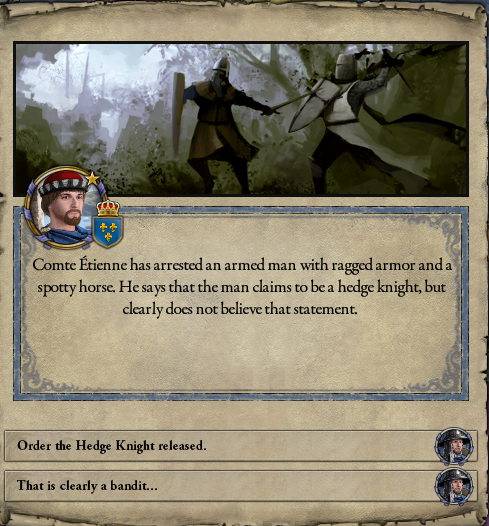
Philippe looked around, afraid to speak and that his fear would show in his voice. The mercenaries had gathered and looked ready to fight. Philippe didn’t know what to do; he insisted on marching on, thinking his presence might keep the peace. His gaze met that of a boy coming from a corner, seeming to search the ground. It was the stable boy, trembling. Philippe thought he wasn’t ready, not ready to kill anyone:
—A noble? —he said, trying to sound firm.
—This ill-formed man is just another vulture, your highness —Count Ertienne shoved the hunchback.
—I am a wandering knight! My father had many sons and little land, in Flanders.
—Shut up, trash! —Ertienne struck the hunchback’s hump with the sword’s pommel.
—Enough, my lord! Release the man —Philippe felt the accusing stares of the soldiers, of Count Ertienne, the women, the villagers, and the stable boy—. If there’s going to be a fight, half of you will die here; there are almost as many soldiers as mercenaries, and these seem ready to slaughter the tied-up villagers first. If you are noble, you show it poorly by looting the lands of the king of the Franks and causing riots... Will you hand over those responsible for the deaths?
The hunchback looked at him without hesitation:
—Richard, Joaquín the Swabian, and Joaquín the Tuscan —he said, pointing at the three men. His companions, who were sobering up and thinking their lives were cheap for a few pots and some salt, lunged at those named to cut their throats.
—Enough, enough! They will be judged in Melun. You will come with us too, what is your name? —Philippe said addressing the hunchback.
—Amadeus, your highness, from Flanders —the hunchback said, trying to remain standing—. To serve the king of the Franks.
Philippe dismounted, ignoring Count Ertienne’s look.
—Your men broke the king’s peace...
—They are my traveling companions, your highness... not my men... I am not responsible for what they did —Amadeus tried to talk his way out; he had already gotten rid of his three competitors for control of the band. Now he needed to get rid of the king.
—If my men were to slaughter you right here, I would feel guilty for not controlling them... Tell them to release the villagers.
Amadeus didn’t have to say a word; the mercenaries hurried to untie the men and women.
—Since you are a wandering knight and have allowed innocent people to die, something must be done.
—“The death of the innocents... what the hell is this boy talking about?” —Amadeus thought, but dared not speak.
—Get on your knees.
Ertienne hurried to shove the man to the ground and draw his sword to cut off his head.
—Stop, my lord! —Philippe extended his hands, holding the hunchback’s; it had started raining—. How many are dead?
Ertienne rolled his eyes looking around. No one was quite sure, but after a moment they counted only one truly dead; the others were bruised but alive. One had seemed dead until a soldier kicked him in the side, eliciting a muffled scream.
—A vassal for a vassal —Philippe kept his hands out—. You’re a knight, right?
Amadeus knew he had lost control of the band when he called them his traveling companions; he had gotten rid of three, but Pablo the Tough Guy was already smiling. He took the king’s hands; it wasn’t the worst luck. He had seen a few ceremonies but wasn’t sure. He heard the king’s voice:
—I, Amadeus, pledge faith and loyalty to you...
—I, Amadeus, pledge faith and loyalty to you, Philippe, king of the Franks, to serve you with my counsel and my sword, as long as you treat me as befits your vassal.
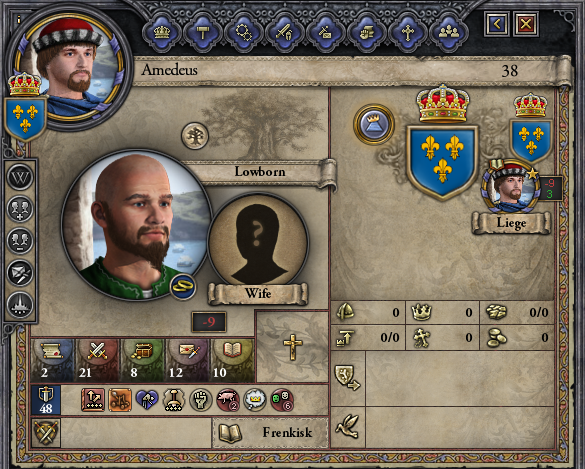
As punishment, the rest of the mercenaries were whipped by the villagers. The innkeeper was all bruised and battered, but you could see his happy smile, two teeth missing, as he approached with a club in hand. Payen thought that something was better than nothing and, since he had already given enough blows to a mercenary, decided not to line up; he just shouted:
—Long live the king!
The villagers joined in the chorus.
Philippe was in the stables; an additional penance had been imposed on him. He closely followed the preparations for the journey, spending hours asking how many horseshoes were needed and how much oats for the horses. Also, whether there was enough money to pay the mercenaries and how many there were. The servants were somewhat exhausted by his intensity but proud to say they had spoken with the king.
“Philippe! Philippe!”

Philippe turned, not because of the loud shout, but because of the strong tug on his cloak. He had to leave the stable boy halfway through explaining the difference between a warhorse and a draft horse. Emma was standing there, holding her skirt to avoid the stable dirt.
“Philippe, did you speak with our mother to let me go to Reims?” Emma said, looking at him intensely.

“Emma... the stables are no place for a princess of France.”
“Alright, Philippe. Did you ask our mother if I can go to Reims?”
“Melun is full of strangers...”
“And any one of them could be happy to kidnap a princess of France. That’s why I let Raoul follow me,” Emma replied, pointing to the bald man running toward them.
“Raoul,” said Philippe, looking at the regent of France.
“Sorry, my lord,” said Raoul, slightly sweaty.
“I told him if he wanted to stop me, he could dare to lay a hand on the princess of the Franks. He’d fall as fast as he got up.” Emma spoke as if Raoul wasn’t there, and the man acted as if he didn’t hear anything.
“Enough, Emma...” Philippe blushed, glancing at Raoul out of the corner of his eye. “That’s enough.”
“Alright, Philippe...”
“I’m your brother, Emma, but also your king.”
Emma fell silent, staring at him intensely. She made a small bow:
“Did you consider my request?”
“I gave you my word it would be done. It saddens me that you think of me as a king without honor.”
“I’m sorry... Philippe... Your Majesty.”
“It will be done, trust me. Now go back inside.”
Emma made a second bow and walked toward the fortress. She paused for a moment:
“If Your Highness weren’t my brother, I might have mistaken him for the stable boy.” Emma looked disapprovingly at Philippe’s dirty clothes and mud-covered boots; after a second bow, she continued on her way.
“Raoul... sorry about that... Could you make sure he returns with the children?”
“Sorry to interrupt, Your Highness. But don’t worry, I always have trusted men watching,” he said, pointing to two men dressed as servants but with war scars. “They alerted me as soon as he escaped his tutors.”
“A strong character...”
“His royal blood can’t be denied. May I have a moment of your time, Your Highness?”
“Of course, Raoul.” Philippe walked inside the fortress with Raoul.
The stable boy could barely contain his joy. Not only could he boast that the king had spoken to him, but he could also say he had talked to the regent and Princess Emma. He saw the envious and expectant looks from the other stable boys. That night, he would pay for the story with plenty of beer at the tavern and first make them listen to the difference between a warhorse and a draft horse, even though they all knew it.
They walked to the regent’s chambers, talking about the weather and how long the journey might take. Raoul opened the door with a bow. To Philippe’s surprise, inside were his mother, Princess Anna, and Prince Bishop Guido. Philippe bowed first to the bishop, kissing his hand, then to his mother.

“Raoul told me you gave your word to your sister,” said Anna, holding a glass of wine. Her eyes were deep, her expression somewhat tense. She wasn’t a beautiful woman, but she was exotic. She had come from the East decades ago to marry King Henry, from the lands of the Rus. She barely had an accent, but something in the tone of her voice still gave her away.
Philippe looked at Raoul with some reproach and then at Bishop Guido. Guido, while looking at Princess Anna, seemed anxious:
“It is important,” said Anna, “that a king can keep his word. I’m listening.”
“If it is good for the people of France to see their king, it would also be good for them to see their sister,” said Philippe without hesitation; he had been preparing his speech since his sister had forced him into this. “It’s not only a penitential journey; otherwise, we wouldn’t be bringing carts, horses, and guards. It is also to show that the King of the Franks does not hide from a bastard...”
“From the Duke of Normandy,” interrupted Anna. “It is not right to refer to a vassal that way.”
“That’s true,” Philippe was somewhat confused. His mother had cut his inspiration, and he didn’t know how to continue. He got distracted looking at the tapestries hanging on the walls. He looked at the wooden table and chairs around it; only his mother remained seated. Guido looked at him urgently. “I ask you to allow me to take my siblings with me.”
Anna looked doubtful, took a sip of wine:
“You will have guards.”
“That will be done; some mercenaries are already being hired, as I understand.”
“Not only mercenaries... The Baron of Chevreuse will accompany you.”
“Even him?! That’s too much!”
“Then it will not be done!” Anna stood up; in other times she would have towered over Philippe, but now the boy had grown.
“You will honor your mother and father, Philippe,” Guido hurried to say. “Since your father is now in the presence of the Lord, I’m sure he is displeased to hear you speak to your mother that way.”
Philippe blushed with shame. He longed to escape the control of his elders. This trip to Reims was his chance; if only servants and mercenaries accompanied him, he could manage, but with the presence of a noble, even a minor one, it would complicate things. Once again, under others’ care, only this time outside Melun. He only hoped that the marshal, Count Ertienne, who was also in Melun, would not join. He wished he had also left, like the rest of the council, to spend the winter on their own lands.
“I’m sorry, mother...”
“The Count of Sens will also go,” said Bishop Guido without letting Anna answer. “You are not trained in medicine, and your sister is young. A cold is dangerous for a child. Yes, you don’t have to tell me you will sleep in castles along the way, and when there is no castle nearby, the king will only stay in the best inns. But that is out of the question.”
Philippe could see that the bishop was speaking to him, though he was really addressing his mother. He had no options. Guido was his ally in this matter. If Anna said no, he would break his word to his sister.
“I dislike it, but I understand. I regret yelling at you, mother.”
Anna looked at Guido, but when she spoke, she addressed Philippe:
“If the good of the kingdom of the Franks requires it, so be it, but I still dislike it.”
Philippe felt she was addressing Guido, even though she looked at him. Anna offered her hand, and he hurried to kiss it:
“Come with me, you need to clean up; you look like a beggar.”
Guido sighed with relief as he poured himself a glass of wine.
"I thought we wouldn’t make it."-said Guido.

"Like any mother, she worries about her children," said Raoul, peeking through the door to make sure Phillipe and Anna were far enough away. He slammed the door shut. He poured himself some wine before continuing. "They don’t realize they’ve already grown up, especially Emma. I pity the poor man who marries her."
"In the end, she’ll submit; it’s a woman’s nature," Guido unconsciously pressed his stomach; lately, he’d been feeling a constant discomfort.
"Maybe... Have you thought about my proposal, my lord?"
"It seems risky... and I don’t think the Duke of Aquitaine will agree. It would be madness; the southern lords would rebel against him."
"It would also be madness not to try. We have few options, my lord," Raul closed the windows after first glancing outside. Then he sat down opposite the bishop. "I know you could convince Duke Guilhem. If you can’t, no one can."
"You’re overestimating my abilities."
Raoul had served the bishop for years. At first, he had been in charge of buying ink and parchment, then the tithes, and when Guido was appointed chancellor by King Henry, the latter entrusted him with organizing royal banquets—a seemingly discreet position, but one that had brought him close to power. Close enough to present himself as a compromise between the great nobles after Henry’s death. They were too jealous of one another to leave the regency in the hands of a commoner. That way, they ensured no one would gain an advantage over the king. Raúl felt comfortable, staying silent when he had to and enduring the slights he had to endure. He always looked over his shoulder. No one knew when one of the great nobles might decide they didn’t want the son of a wealthy cloth merchant, after all still a merchant, to be in charge of the regency. Outside a few guards or servants, he had no knights at his service to prevent someone from cutting his throat—at least not yet.
"It’s a journey too long to Bordeaux..." Guido felt the stomach pain ease and discreetly scratched above his navel.
"Duke Guilhem’s court is now in Poitiers, not Bordeaux; it’s closer... because of William."
"You know we tried once already; the Duke of Aquitaine’s answer was blunt. He won’t marry his daughter to the king just to erase his house’s name."

"The brother... we haven’t tried with Prince Hugues."
"If he already rejected the king, do you think he’d accept the brother? It would be the same result."
"He rejected the king because that would mean Aquitaine would fall under the crown’s control. It’s not the same with Prince Hugues."
"It’s almost the same... Hugues is the heir."
"I don’t think so. We have to try. The crown is alone... we need a strong ally. If we marry him to one of William’s daughters, the bastard will rule France, win or lose in England... you said so yourself..."
"That’s true..."
"If we look towards Hispania, considering the king’s holy piety, we’ll end up exhausted fighting the infidels..."
"Enough... you don’t need to go on... I’m already ashamed that such an unchristian thought came from me."
"You are a loyal man to the kingdom... let’s give this idea a chance..."
Raoul saw Guido still hesitating. He just had to push him a little more; if anyone could convince Guilhem, it was Guido. He had known it the day Guido convinced his stingy father to let his only son abandon the family business to serve the Church; he was a man capable of convincing anyone. Later he discovered he was also a man who could be pushed to convince anyone. He asked God’s forgiveness for using him.
"Are you still working on your poems?"
"You know I am; the ink is almost finished."
"I’ll order more; you don’t need to worry about that," Raúl poured some more wine for the bishop. "There are no poets like the Occitans... I’m sure you could find great inspiration at the duke’s court..."
"You’re shameless." Guido had been thinking about the idea. Something could be done, it would hardly work, but he trusted Raúl. There was nothing to lose by trying. "When could we leave?"
"I serve the kingdom as you do," Raúl sighed relieved inwardly. "As soon as the king and Princess Emma leave. Leave the queen mother to me; I will convince her to allow Prince Hugues’s journey south."
They kept talking most of the day, while servants brought them wine, cheese, grapes, and some meat. Guido spoke at length about the depths and subtleties of the Occitan language, much closer to Latin than the language of the Franks. He was surprised to learn that Raúl had been studying the language in his little free time and congratulated him on his diligence. From the start, he had noticed that the weaver’s son had a good mind for numbers, but not that he was also interested in the noble arts. He sent one of the servants to bring the parchments he had been working on for his Vox Francorum, an elegy to the Capetian kings. Raoul could only think that soon he would have knights at his service. Late at night, he sent for one of the stable boys and gave precise orders to reserve some horses and also a donkey.
Out of pure envy, they had made him work late into the night. Payen lingered reluctantly in the tavern, which was packed with mercenaries, rough and heavily armed men. The stable boys had been forced to corner themselves in one side of the room. But for now, he felt like a king.
At first, they treated him with indifference, trying to see if they could get something out of him without paying. But they hadn’t counted on his patience. Finally, they asked him, and he simply said he was thirsty. They cursed him while buying him a full pint; he savored the taste of the free beer.
—The king was asking me about the difference between a travel horse and a cart horse —he began to speak.
—One is strong and muscular, and the other is agile with slender legs.
Simon was four years older and not well liked; he had little patience and usually whipped the animals as soon as they showed reluctance. But everyone sided with him, elaborating on the differences between the two types of horses to annoy Payen. He simply kept drinking his beer until the conversation died down, and they bought him a second pint.
The fire crackled, and the tavern keeper defended the pork on the spit from a particularly voracious group of mercenaries.
—Well, the king, blessed be his name, didn’t know, because that’s the stable boys’ job, not the kings’. Then came Princess Emma and the regent... The king had promised to take her with him to Reims, so I already have one of the white mares ready, which is quite docile... the new one... for Princess Emma.
—What would you know if she’s going or not? —Simon was choking on bread dipped in oil and garlic.
—Well, it turns out the king gave his word, and what the king says is law.
—What the nobles say is law, Payen. If the Duke of Flanders doesn’t give permission to pay the forage at once... I don’t think that mare will leave Île-de-France.
That made most of the group turn against Simon, because the Duke of Flanders controlled the kingdom’s finances and, although he was with his son-in-law Duke William of Normandy in Rouen, he refused to loosen the purse strings.
—You’re a pig and you eat like a pig, Simon.
—And you think you’re better than you are, Payen. You didn’t speak with any princess or any regent; you just stood there while none of them noticed you. Even a mule could do that...
Payen stood up, grabbed his pint of beer, and threw it at Simon’s head. Simon was faster and the pint smashed against the wall.
The stable boys split into two groups quickly and began hitting each other with chairs and fists, amid the innkeeper’s hysteria as he called for the guards. Taking advantage of the situation, the mercenaries pounced on the pork, cutting it into pieces and laughing.
—Look what you did, you damned pigs! —the innkeeper shouted, grabbing a club to charge at the mercenaries.
The man didn’t stand a chance; the mercenaries wore chainmail and were trained for war. They disarmed him without trouble and began beating him with the club.
The stable boys felt guilty, since the innkeeper often gave them beer on credit, so they grabbed chairs and charged at the mercenaries. They managed to break the heads of a couple who were caught off guard, but soon they had to run out of the tavern. The mercenaries had drawn their swords and were drunk enough to spill blood.
—Melun, stand up! Stand up, Melun, they’re killing your sons! —Simon shouted and ran like the devil, for his life depended on it.
Some of the villagers came out carrying clubs or farming tools. Many others preferred to barricade the doors, and only the village fool ran off toward the castle.
The mercenaries were few, but they knew what they were doing. They gave the villagers a monumental beating. Payen and another boy tried to climb onto a roof when a mercenary appeared. The boy ran off, but Payen was frozen with fear.
The mercenary had his sword drawn, took a couple of steps toward him, and Payen noticed he was quite drunk. He prayed to the Virgin Mary and took off running. The Virgin must have heard his prayers because the man stumbled halfway through the chase.
It was his moment to escape the village, but he could still hear the screams. He looked around desperately and found a rock big enough. The mercenary was just getting up when Payen smashed the rock into his head, sending him back to the ground. The man began to vomit, and Payen thought he had killed him, but the man was only howling in pain and vomiting as well.
He still had to struggle and punch him a couple of times to take the sword away. Then he went back to the middle of the fray. The women peeked through the shutters, shouting curses at the mercenaries. A couple of mercenaries had come out of the tavern with torches ready to set fire.
Two men lay dead on the ground; Payen recognized them by sight... servants, just like him.
The mercenaries began to loot and crush the resistance; they knew how to do it. Courage abandoned Payen, who hid as best he could in a corner. First, they went after the men still standing, ignoring the women. Then, they started grabbing whatever they could from the houses: salt, metal pots, and supplies. Only then did they begin to divide up the women, but they were poorly coordinated. A hunchback who seemed to be in charge kept falling down drunk. It was a rather improvised raid.
—The king! The king! —shouted one of the women.
The sound of horses was deafening; about fifty riders in chainmail, helmets, shields, and lances appeared. They wore the colors of the royal house and the Count of Bourges. The kingdom’s marshal rode at the head of the group, sword in hand:
—Drop your weapons! Drop your weapons in the name of the king!
Payen hurried to throw his sword as far as possible, but the mercenaries seemed to be weighing their options; he regretted having done it.
—Drop your weapons now! —the Count of Bourges looked furious.
Philippe was terrified but tried not to show it. His mother had locked herself in with his siblings, and for the first time, he had dared to disobey her. Guido and Raoul had also tried to stop him. When the boy came running, shouting in the Melun courtyard, alarm spread. At first, it was thought that some noble might have dared to loot the village and try his luck. But no noble would dare so much, except his uncle, the Duke of Burgundy, who had already spilled family blood. Philippe feared his uncle; that man did not respect the laws of men or God. But he couldn’t just lock himself in Melun when only a few kilometers away the crown’s subjects were being dispossessed.
—If he catches you, who knows what he’ll do! —Anna of Kiev begged him, grabbing his hand and pulling him. Hugues barely spoke and looked nervous. Emma, who was trying to appear brave, said nothing either—. I forbid you! I am your mother!
—And I am the king of the Franks —Philippe kissed her on the forehead.
He felt mean for having so strongly wished the Duke of Bourges wasn’t in Melun. Philippe had never been to war, and although he knew how to hold a sword, he didn’t overestimate his skill. Besides, he counted on the knights of Bourges if it really was a raiding party from Burgundy.
—I will give my life for the king if necessary, Your Highness —Etienne of Bourges was already on his horse, giving orders to his men to form up.

They rode as if the devil were chasing them. Philippe saw some houses burning and heard the screams. The banner of Bourgogne was nowhere to be seen. The smoke made his eyes water and dried out his throat. He was stunned by the sight of the dead; he had never seen one before. He fought back the urge to vomit; he couldn’t afford to.
Count Ertienne shouted and rode his horse back and forth, but the men refused to drop their weapons. The women screamed for justice and the peasants writhed under the boots of the mercenaries. Philippe barely had time to react when Count Ertienne approached; at some point he had dismounted and was dragging a hunchback along with two other guards:
—This is the scoundrel! —Ertienne was furious—. This little man is the scoundrel responsible! Germans, your highness, Germans on their way to Normandy!
—I am a noble, you cannot treat me like this! —the hunchback struggled furiously.

Philippe looked around, afraid to speak and that his fear would show in his voice. The mercenaries had gathered and looked ready to fight. Philippe didn’t know what to do; he insisted on marching on, thinking his presence might keep the peace. His gaze met that of a boy coming from a corner, seeming to search the ground. It was the stable boy, trembling. Philippe thought he wasn’t ready, not ready to kill anyone:
—A noble? —he said, trying to sound firm.
—This ill-formed man is just another vulture, your highness —Count Ertienne shoved the hunchback.
—I am a wandering knight! My father had many sons and little land, in Flanders.
—Shut up, trash! —Ertienne struck the hunchback’s hump with the sword’s pommel.
—Enough, my lord! Release the man —Philippe felt the accusing stares of the soldiers, of Count Ertienne, the women, the villagers, and the stable boy—. If there’s going to be a fight, half of you will die here; there are almost as many soldiers as mercenaries, and these seem ready to slaughter the tied-up villagers first. If you are noble, you show it poorly by looting the lands of the king of the Franks and causing riots... Will you hand over those responsible for the deaths?
The hunchback looked at him without hesitation:
—Richard, Joaquín the Swabian, and Joaquín the Tuscan —he said, pointing at the three men. His companions, who were sobering up and thinking their lives were cheap for a few pots and some salt, lunged at those named to cut their throats.
—Enough, enough! They will be judged in Melun. You will come with us too, what is your name? —Philippe said addressing the hunchback.
—Amadeus, your highness, from Flanders —the hunchback said, trying to remain standing—. To serve the king of the Franks.
Philippe dismounted, ignoring Count Ertienne’s look.
—Your men broke the king’s peace...
—They are my traveling companions, your highness... not my men... I am not responsible for what they did —Amadeus tried to talk his way out; he had already gotten rid of his three competitors for control of the band. Now he needed to get rid of the king.
—If my men were to slaughter you right here, I would feel guilty for not controlling them... Tell them to release the villagers.
Amadeus didn’t have to say a word; the mercenaries hurried to untie the men and women.
—Since you are a wandering knight and have allowed innocent people to die, something must be done.
—“The death of the innocents... what the hell is this boy talking about?” —Amadeus thought, but dared not speak.
—Get on your knees.
Ertienne hurried to shove the man to the ground and draw his sword to cut off his head.
—Stop, my lord! —Philippe extended his hands, holding the hunchback’s; it had started raining—. How many are dead?
Ertienne rolled his eyes looking around. No one was quite sure, but after a moment they counted only one truly dead; the others were bruised but alive. One had seemed dead until a soldier kicked him in the side, eliciting a muffled scream.
—A vassal for a vassal —Philippe kept his hands out—. You’re a knight, right?
Amadeus knew he had lost control of the band when he called them his traveling companions; he had gotten rid of three, but Pablo the Tough Guy was already smiling. He took the king’s hands; it wasn’t the worst luck. He had seen a few ceremonies but wasn’t sure. He heard the king’s voice:
—I, Amadeus, pledge faith and loyalty to you...
—I, Amadeus, pledge faith and loyalty to you, Philippe, king of the Franks, to serve you with my counsel and my sword, as long as you treat me as befits your vassal.

As punishment, the rest of the mercenaries were whipped by the villagers. The innkeeper was all bruised and battered, but you could see his happy smile, two teeth missing, as he approached with a club in hand. Payen thought that something was better than nothing and, since he had already given enough blows to a mercenary, decided not to line up; he just shouted:
—Long live the king!
The villagers joined in the chorus.


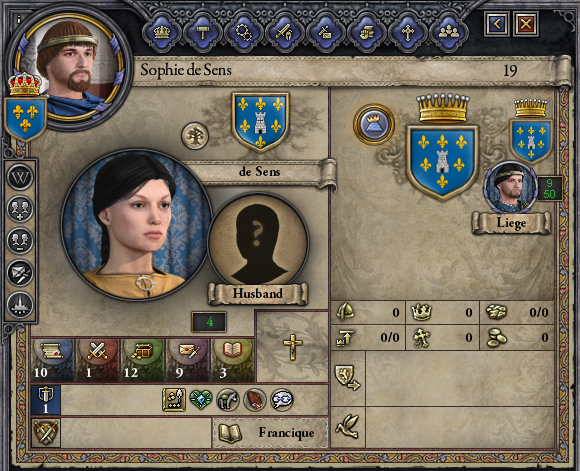
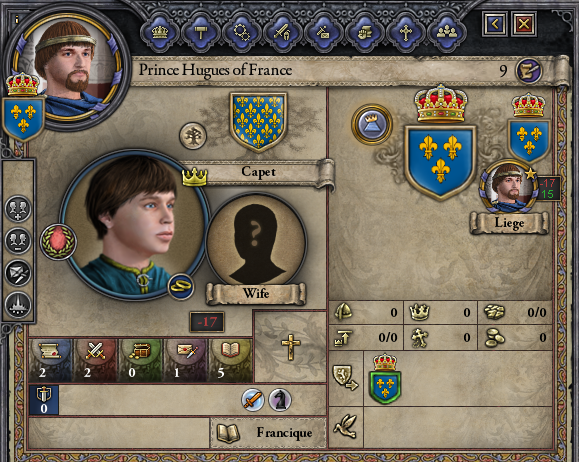
.png)
.png)
.png)
.png)
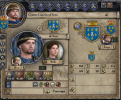
.png)
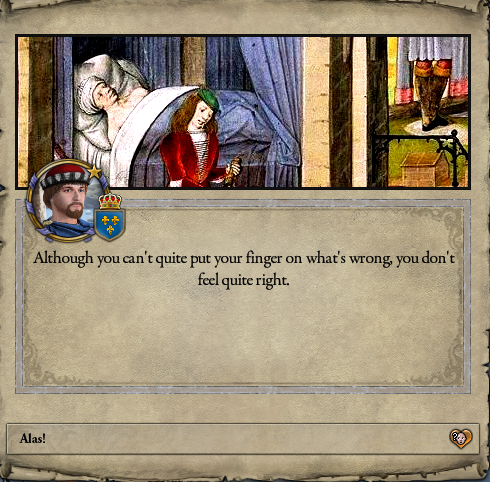
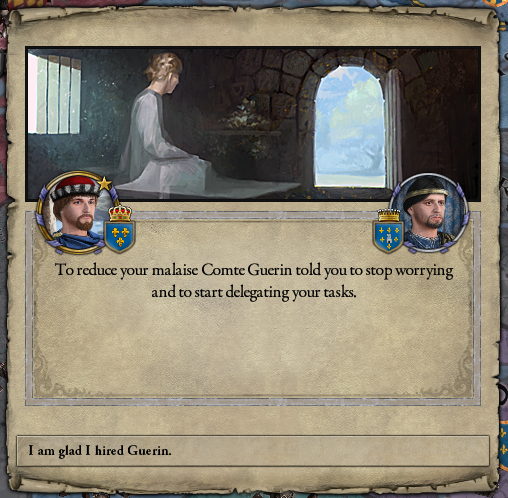
.png)
.png)